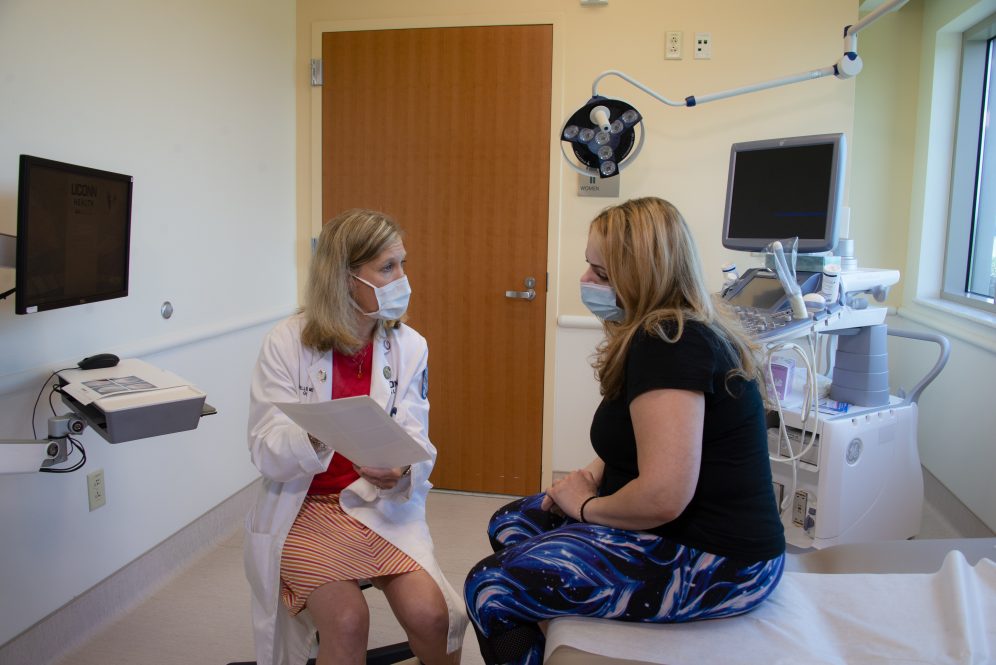Shhhh….that’s private. Women tend not to talk about problems that surround their reproductive issues and with the normalization of female pain, women have lived for years with painful and debilitating menstrual periods, painful intercourse, infertility, bowel, and urinary issues. Endometriosis was often the culprit, but by the time it was addressed, it was in the late stages.
Dr. Danielle Luciano, associate professor of Obstetrics and Gynecology at UConn Health is glad to see the tide turning. The increased awareness surrounding endometriosis has increased the number of women being proactive about their medical treatment for painful periods, painful intercourse, chronic pelvic pain, and infertility for themselves and their daughters.
“Where it used to take seven years before a diagnosis, moms are now bringing their daughters in as early as 15 or 16 years old, indicating they had miserable periods and they don’t want their daughter to suffer as they did, for as long as they did,’’ says Luciano.
Endometriosis is an often painful disorder in which tissue similar to the tissue that normally lines the inside of your uterus, the endometrium, grows outside the uterus. Endometriosis most commonly involves the ovaries, fallopian tubes, and the tissue lining the pelvis.
Although endometriosis affects an estimated one in ten women, little is known about the condition which can cause debilitating pain and infertility.
Early diagnosis is key to finding the appropriate treatment and reducing the time of suffering. Medical management and surgical management are the options that women currently have to treat endometriosis.
Medical management is a hormonal suppressive therapy that suppresses the lining from growing. Birth control pills are the first line for young women without advanced disease. If you minimize periods, then you minimize pain.
However, medical management doesn’t work for those who would like to get pregnant as it prevents them from doing so and for them, surgical management is the option. Surgical management is performed on women for whom medical management doesn’t work or those who want to get pregnant. This minimally invasive surgery removes as many of the cysts and lesions of the disease as possible to restore normal anatomy.
Hysterectomy is the last resort as it is not a 100% cure and there is still an 8% chance of recurrence.
While these management therapies work in the short term to help buy time to improve fertility or for targeted therapy, they are not long-term treatments and surgery may need to be repeated. The only time endometriosis subsides is during pregnancy and at menopause.
Luciano recently joined the Connecticut Endometriosis Working Group, formed by state Rep. Jillian Gilchrest to bring awareness and push forward research.
The working group will focus on the education of health care providers such as pediatricians, primary care physicians, and school nurses to recognize the signs of endometriosis so patients are treated earlier. It will also work on equity and disparities in health care surrounding menstruation and endometriosis through programs and data collection.
Girls with endometriosis that have bad periods miss 1-2 days of school a month, this is the same for women in the workplace – over a year of significant loss of school and work.
“Treatment makes us more productive members of society and in our own lives if we find a cure,” says Luciano.
Also part of the working group, Luciano is working in partnership with The Jackson Laboratory, Elise Courtois, Ph.D., associate director of Single Cell Biology and an endometriosis researcher at The Jackson Laboratory. Courtois is studying tissue samples from endometriosis patients. The goal of this innovative research is to learn how endometriosis tissue interacts with surrounding tissue.
The legislature’s Public Health Committee voted to send a bill establishing an endometriosis clinical data and biorepository program to the House for a vote. Advocates say this initiative will lead to discoveries that can help speed up diagnosis and provide treatments.
When performing surgery for endometriosis, the standard of care is to remove the tissue and send it to pathology. After consenting with the patient the collection of tissue from participants takes the extra step after pathology to JAX for research. The disease is complex and this data and research will help better understand the disease.
“I have never had an easier time getting women to participate in a study,” says Luciano.“When I explain to patients that it will be used for research to learn more about endometriosis and find more targeted and preventative therapies, they are more than happy to participate.”
“We as women need to be better advocates for ourselves and our daughters,” says Luciano. “Women don’t need to suffer.”
UConn Health is a designated Center of Excellence in Minimally Invasive Gynecology. You can visit the website to learn more and find the help you may need.



